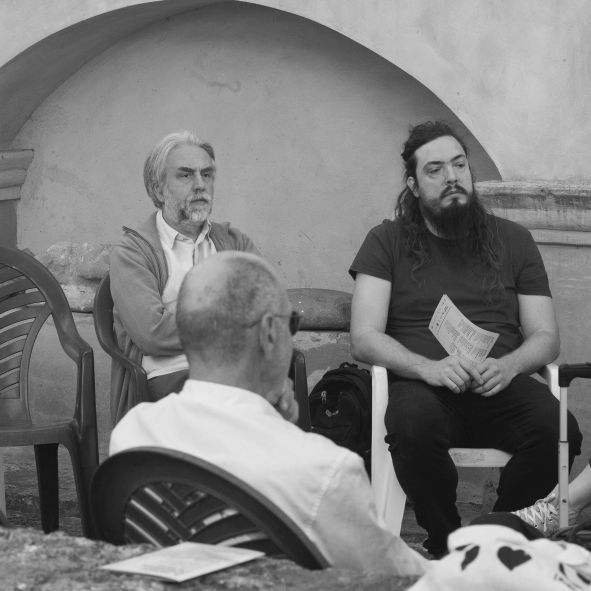Kristina Bojanović
Humanistic Studies-Podgorica, Montenegro
Kristina Bojanović, professor at Humanistic Studies - Podgorica, Montenegro. Her areas of expertise include contemporary French philosophy, ethics, and theories of culture and gender. She is a member of Philosophy Committee of the Montenegrin Academy of Sciences and Arts.
Pasivnost kao etički zahtjev
Oslanjajući se na filozofsku i etičku misao Emanuela Levinasa, u ovom predavanju govorit ću o značaju koncepta pasivnosti kao neizostavnog etičkog pristupa u razmatranju zla, bilo fizičkog ili metafizičkog. U tom smislu, akcenat će biti stavljen na razumijevanje rata i nasilja kao situacija koje ukidaju moral i poništavaju Drugog. Pored toga, osvrnut ću se na pojam ženskog kao uslov za stvaranje etike beskonačnosti i filantropske filozofije. Žensko je, prema mom tumačenju, ključni fenomen u razmatranju i razumijevanju etike, posebno kroz svoje zahtjeve za pasivnošću kao mogućim odgovorom na zlo. Također, pokušat ću da objasnim zašto je pasivnost, kao središnji konstitutivni modalitet etičke subjektivnosti, osnova ljudske prakse, njezine transcendencije i njezinog radikalnog preobražaja.
Pitanja:
1. Zapadna konstrukcija djelovanja omogućuje samo izvjesni modus prakse zasnovane na okupljanju pojedinaca oko univerzalne istine, ali joj manjka artikulacija zajedničke prakse koja bi insistirala na relaciji licem-u-lice, formi aktualizacije koja proishodi iz tijela u jedinstvenosti, otvorenosti i ranjivosti. Kako bi Levinasov etički projekat mogao promijeniti takvu koncepciju društveno-političke prakse?
2. Kako se može opravdati pasivnost kao ključni princip u angažiranom i aktivističkom svijetu, čiji se postulati oslanjaju na ideju da je reakcija (primjerice, na nepravdu ili zlo) jedini etički i duboko moralni čin, iako se i sam aktivizam često ispostavlja kao ideološki i etički izopačen i zao?
3. Levinasov subjekt proizlazi iz odgovora na poziv za pravdu prema drugom ljudskom biću. Odgovornost za Drugoga – u svom prethođenju u odnosu na slobodu – jeste pasivnost pasivnija od svake pasivnosti, izloženost drugome bez preuzimanja te izloženosti, izloženost bez ostatka. Kako razumijemo i tumačimo prvenstvo pravde nad slobodom; da li briga i pravda za drugog mogu postojati i opstati (i) bez slobode?
Passivity as an ethical demand
Drawing on the philosophical and ethical thought of Emmanuel Levinas, in this lecture I will discuss the importance of the concept of passivity as an indispensable ethical approach regarding evil, whether physical or metaphysical. In this sense, emphasis will be placed on understanding war or violence as a situation that abolishes morality and erases the Other. In addition, I will address the notion of the feminine as a condition for the creation of an ethics of infinity and a philanthropic philosophy. The feminine will emerge as a key concept in the consideration and understanding of ethics, especially through its demands for passivity as a possible response to evil. Also, I will try to explain why passivity, as the central constitutive modality of ethical subjectivity, is the basis of human practice, its transcendence, and its radical transformation.
Questions:
-
The Western construction of action only enables a certain mode of practice based on the gathering of individuals around a universal truth; but it lacks the articulation of a common practice that would insist on a face-to-face relationship, a form of actualization that comes from the body in its uniqueness, openness and vulnerability. How could Levinas' ethical project change such a conception of socio-political practice?
-
How can passivity be justified as a key principle in an engaged and activist world, whose postulates rely on the idea that reaction (for example, to injustice or evil) is the only ethical and deeply moral act, even though activism can often turn out to be ideologically and ethically perverse and evil?
-
Levinas' subject arises from a response to the call for justice for another human being. Responsibility for the Other - in its precedence to freedom, is a passivity more passive than any passivity - exposure to another without taking on that exposure itself, exposure with no remains. How do we understand and interpret the primacy of justice over freedom; could care and justice for Other exist and persist even without freedom?
Links:
http://books.ms/main/26DDE612645A4374FF85754F2C8F6652
http://books.ms/main/0AF857A82C6F71407ACC80546741A8A1
https://www.academia.edu/120023010/TRAG_DRUGE_Pojam_%C5%BEenskog_filozofiji u Emanuela_Levinasa
https://ojs-gr.zrc-sazu.si/primerjalna_knjizevnost/article/view/8231/7654
Kristina Bojanović is the author of many philosophical works, published in reputable international and domestic journals, as well as the philosophical monograph Trag Druge. Pojamženskog u filozofiji Emanuela Levinasa (CID, Podgorica 2022) and the poetic work Prisutnik(Ouroboros, Podgorica 2024).



































































